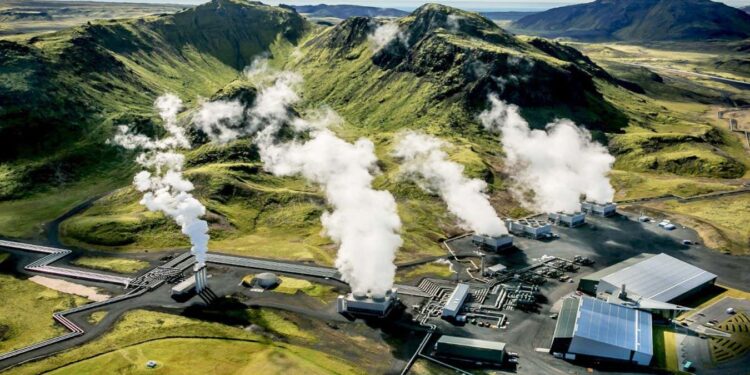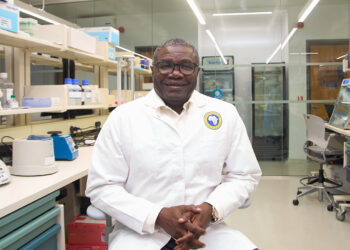
A geothermal power plant in Iceland where carbon dioxide has been injected underground for long-term storage
Sigrg/CarbFix
The world may run out of storage space for captured carbon dioxide within the next two centuries, according to new research that suggests the planet’s practical capacity for holding CO2 underground is far less than we thought.
Storing captured carbon dioxide in underground reservoirs has been touted by governments and industry as a way to reach net zero without eradicating fossil fuel use.
The planet’s capacity for storing this CO2 was thought to be vast, with industry estimates putting global geological storage capacity at around 14,000 gigatonnes of CO2. “Until today, the storage capacity was, to all intents and purposes, considered limitless,” says Joeri Rogelj at Imperial College London, UK.
But together with colleagues, Rogelj has conducted further analysis of storage reserves and found the usable volume of storage space may be far smaller. The team analysed stable geological formations, excluding areas affected by risk factors such as proximity to large cities, environmentally sensitive landscapes or regions vulnerable to earthquakes. Once those risk factors are taken into account, they conclude that just 1460 gigatonnes of geological storage capacity is available globally.
“From a position where we have practically unlimited storage potential, now the CO2 storage potential that we can prudently rely on becomes a precious resource,” says Rogelj. “We have reduced the practical potential that we think one should assume for CO2 storage by a factor of 10.”
Most climate projections assume some level of underground carbon storage will be needed to enable the world to reach net-zero emissions. How much storage will be used depends largely on how far the world manages to reduce fossil fuel use. If we continue to use geological storage to sequester large volumes of emissions from fossil fuel plants once net zero has been reached, the world’s carbon storage is likely to run out by 2200, the researchers warn.
Rogelj argues that his findings mean we should treat underground carbon storage sparingly, when all other options to decarbonise have been exhausted. For example, rather than capturing emissions from coal or gas power plants and storing them underground, economies should rely on zero-emission power sources where possible, he says.
That would free up underground storage capacity for CO2 trapped using technologies such as direct air capture (DAC), which draws out excess CO2 directly from the atmosphere. DAC, as well as other so-called “negative emission” technologies, could offer the world a route to going beyond net-zero emissions and delivering net-negative emissions, effectively reversing climate change.
If the 1460 gigatonnes of feasible underground CO2 storage capacity were reserved for this CO2 drawdown, the world could reverse up to 0.7°C of warming, Rogelj and his colleagues calculate.
However, Stuart Haszeldine at the University of Edinburgh in the UK warns that while the usable capacity of geological storage is likely to be less than industry estimates of 14,000 gigatonnes, he suspects the new, lower figure is too conservative.
The team’s approach to risk factors is “extremely cautious”, he argues, pointing out that some earthquake-prone areas, such as the North Sea, are effectively excluded by their approach but can still be safe places to sequester carbon. “We know enough about carbon storage and oil reserves to know that if you have an oil field full of oil or gas or carbon dioxide, you can have a magnitude 6 earthquake and it shakes it, but then nothing happens,” says Haszeldine.
Haszeldine points out that most analysts and researchers assume carbon sequestration will be used to help the world transition away from fossil fuels. That means the volume of carbon injected underground each year should decline once the world has reached net-zero emissions, he says.
“[Carbon capture and storage] has never really been considered as the end point, the end solution, for everything, for all our climate change pessimism and ills,” Haszeldine says. “It’s really viewed as a transitional set of actions, where that transition might last for 30, or 50, or even 150 years, to transition out of oil and gas. For that reason, you don’t need truly astronomic amounts of CO2 storage capacity.”
Topics:
- climate change/
- carbon capture
Source link : https://www.newscientist.com/article/2494869-we-may-have-10-times-less-carbon-storage-capacity-than-we-thought/?utm_campaign=RSS%7CNSNS&utm_source=NSNS&utm_medium=RSS&utm_content=home
Author :
Publish date : 2025-09-03 16:00:00
Copyright for syndicated content belongs to the linked Source.








